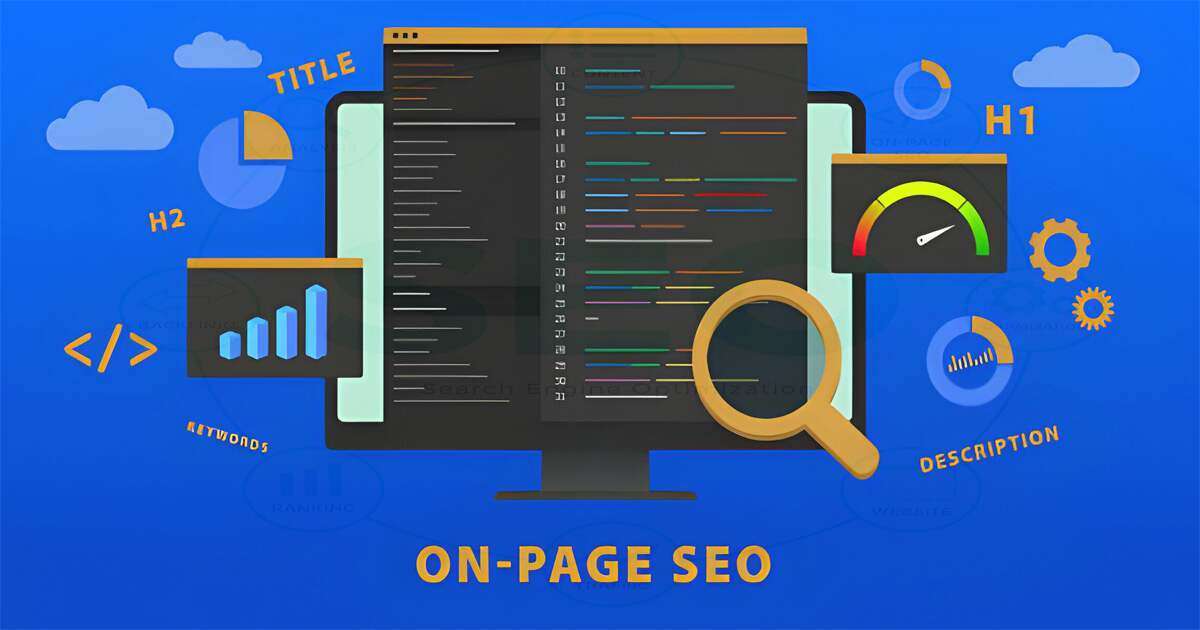In the ever-evolving digital landscape, SEO (Search Engine Optimization) is a cornerstone for businesses striving to enhance their online presence. SEO is the science of optimizing a website to improve its visibility on search engines like Google, Bing, and Yahoo. By strategically incorporating relevant keywords, refining meta tags, and ensuring a seamless user experience, SEO aims to rank websites higher in search engine results.
Effective SEO involves a multifaceted approach, encompassing both on-page and off-page optimization techniques. On-page SEO includes refining individual web pages, optimizing content, and ensuring proper HTML tags. This includes keyword-rich content, compelling meta descriptions, and structuring data for search engine algorithms to interpret quickly.
On the other hand, off-page SEO concentrates on building a website’s credibility and authority through external factors such as quality backlinks and social signals. A well-rounded SEO strategy boosts organic traffic and establishes trust and relevance, crucial elements in today’s competitive online environment.
Keeping up with search engine algorithms and trends is pivotal in SEO. Regular updates, algorithm changes, and technological advancements necessitate a dynamic approach to SEO practices. Businesses investing in SEO are better positioned to reach their target audience, drive valuable organic traffic, and achieve sustainable online success. As the digital landscape continues to evolve, SEO remains an indispensable tool for businesses looking to navigate and thrive in the competitive online marketplace.
Search Engine Rankings Importance
Achieving and maintaining high search engine rankings is a paramount goal for businesses seeking a robust online presence. In the dynamic world of digital marketing, where competition is fierce, securing top positions on search engine results pages (SERPs) is a testament to a website’s relevance and authority.
The journey to superior search engine rankings involves a meticulous blend of on-page and off-page optimization strategies. On-page efforts include keyword optimization, content relevance, and a user-friendly website structure, ensuring search engines easily comprehend and prioritize the site’s content.
On the other hand, off-page optimization focuses on building a robust backlink profile. Quality backlinks from reputable sources signal to search engines that the content is trustworthy and valuable, boosting rankings. Social signals and online reputation management also play integral roles in enhancing a website’s credibility.
Monitoring and adapting to search engine algorithms is crucial in the quest for top rankings. Algorithm updates can impact rankings significantly, making it imperative for businesses to stay informed and adjust their strategies accordingly.
Search engine rankings reflect a website’s authority, relevance, and user satisfaction. Businesses that invest in comprehensive SEO strategies, incorporating both on-page and off-page elements, are better positioned to ascend the ranks, attract organic traffic, and, ultimately, establish a formidable online presence. Prioritizing search engine rankings is not just about visibility; it’s a strategic move toward sustained online success.
On-Page Search Engine Optimization Strategies
On-page SEO Optimization is pivotal for enhancing a website’s visibility and relevance in the intricate digital marketing landscape. This multifaceted strategy involves fine-tuning individual web pages to align with search engine algorithms, ultimately influencing rankings.
Critical components of On-Page SEO Optimization include strategic keyword integration, ensuring that content reflects the language and queries of the target audience. Meta tags, such as meta titles and descriptions, are crucial in summarizing page content for users and search engines, contributing significantly to click-through rates.
The structural aspects of a website, including URL optimization and well-defined header tags (H1, H2, etc.), are integral components of On-Page SEO. A user-friendly website structure enhances visitor navigation and facilitates the crawlability of the site by search engine bots.
Content quality and relevance are paramount. Engaging, informative, and valuable content attracts visitors and satisfies search engine criteria for ranking. Multimedia elements like images and videos are optimized for faster loading times, contributing to a positive user experience.
By focusing on these On-Page SEO Optimization elements, businesses can effectively communicate their offerings to search engines and, in turn, to their target audience. This meticulous approach boosts search rankings and establishes a solid foundation for a website’s online success. As search algorithms evolve, staying vigilant and adapting On-Page SEO strategies ensures a competitive edge in the digital marketplace.
Off-Page Search Engine Optimisation
Off-Page Search Engine Optimization (SEO) is the linchpin of a comprehensive digital marketing strategy, extending beyond the confines of a website to build credibility and authority across the vast online landscape. Unlike its on-page counterpart, off-page SEO focuses on factors external to the website, solidifying its prominence in search engine results.
Central to off-page SEO is the cultivation of a robust backlink profile. Quality backlinks from authoritative websites act as digital endorsements, signaling to search engines that the content is reputable and deserves higher rankings. Social media engagement, another crucial off-page element, amplifies a brand’s reach and fosters a community around its offerings.
Online reputation management plays a pivotal role in off-page SEO, as positive reviews and mentions across the web contribute to a brand’s credibility. This, coupled with active participation in forums and communities related to the industry, establishes the website as an authoritative source in its niche.
While on-page SEO ensures a website is optimized for search engine algorithms, off-page SEO establishes the website as a trustworthy entity in the eyes of both search engines and users. The synergy between on-page and off-page strategies is integral for achieving sustained visibility and success in the competitive digital landscape. By investing in off-page SEO, businesses enhance their online presence and fortify their position as industry leaders, fostering long-term growth and recognition.
Local SEO Strategy
Local SEO is a game-changer for businesses looking to connect with their nearby audience and establish a strong foothold in the local market. This specialized branch of search engine optimization tailors strategies to enhance a business’s visibility in location-based searches, making it an invaluable asset for brick-and-mortar stores and service providers.
To bolster local search rankings, critical elements of local SEO include optimizing the Google My Business (GMB) profile and ensuring accurate business information, such as name, address, and phone number (NAP). Positive customer reviews on platforms like Google Reviews are pivotal in building trust and attracting local clientele.
Local keyword optimization is paramount, aligning website content with specific geographical locations to capture users’ attention to local products or services. This includes localized meta tags, relevant content, and the inclusion of location-specific keywords.
Cultivating local citations across online directories further solidifies a business’s local presence. Consistent and accurate information across these platforms enhances a business’s credibility in the eyes of both users and search engines.
Local SEO not only improves search rankings but also contributes to improved foot traffic and conversion rates. As mobile searches continue to rise, the significance of local SEO in driving potential customers to physical establishments cannot be overstated. By embracing local SEO strategies, businesses can tap into the power of proximity, effectively connecting with their local audience and maximizing their online visibility within their community.
White Hat SEO Techniques
White Hat SEO, the ethical cornerstone of search engine optimization, focuses on sustainable and organic strategies to improve a website’s visibility without resorting to manipulative tactics. Compared to its counterpart, Black Hat SEO, White Hat SEO prioritizes long-term success, user experience, and adherence to search engine guidelines.
The foundation of White Hat SEO lies in quality content creation. By producing valuable, relevant, and engaging content, websites attract organic traffic and establish authority in their respective industries. Keyword optimization is done judiciously, ensuring content aligns seamlessly with user intent without sacrificing authenticity.
Inbound link building is another critical element of White Hat SEO. Rather than pursuing spammy or manipulative practices, White Hat SEO focuses on acquiring high-quality, natural backlinks from reputable sources.
Technical optimization is not overlooked in White Hat SEO. Ensuring a website’s structure is user-friendly, mobile-responsive, and easily navigable contributes to a positive user experience, a factor highly regarded by search engines in determining rankings.
White Hat SEO is not just about meeting search engine algorithms; it’s about building a trustworthy online presence that resonates with users and search engines alike. Businesses prioritizing ethical SEO practices achieve sustainable rankings and foster a positive and enduring relationship with their audience, laying the groundwork for long-term success in the digital realm.
Black Hat SEO
While tempting for quick wins, Black Hat SEO involves unethical and manipulative practices that violate search engine guidelines. This dark side of search engine optimization focuses on exploiting algorithm loopholes to artificially boost rankings, often at the expense of user experience and long-term sustainability.
Keyword stuffing, a typical Black Hat tactic, involves excessively and unnaturally incorporating keywords into content, sacrificing readability and user value. Cloaking is another dubious practice where content presented to search engines differs from what users see, deceiving algorithms to achieve higher rankings.
Link schemes are a hallmark of Black Hat SEO, involving the creation of artificial links through link farms or purchasing links to manipulate search engine algorithms. This tactic can lead to penalties and damage a website’s reputation.
Scraping and duplicate content are also prevalent in Black Hat strategies, where unscrupulous individuals copy and republish content from other sources to inflate their website’s perceived value.
Engaging in Black Hat SEO may yield immediate results, but the consequences are severe. Search engines actively penalize websites employing these tactics, leading to lowered rankings, blocklisting, and irreversible damage to online credibility. Users quickly recognize and distrust websites that resort to such tactics, eroding any potential for long-term success.
In the ever-evolving digital landscape, where transparency and ethical practices are valued, Black Hat SEO’s allure is detrimental and counterproductive. Businesses committed to sustainable growth and positive online reputations are wise to steer clear of these unethical practices, opting instead for the ethical strategies encapsulated in White Hat SEO.
Importance Of Mobile Optimization In Digital Marketing
Mobile optimization is critical to modern web development, ensuring that websites are visually appealing and function seamlessly across various mobile devices. With the surge in mobile usage, Google and other search engines prioritize mobile-friendly websites, making mobile optimization a critical factor in search rankings.
Responsive design lies at the heart of mobile optimization, allowing websites to adapt to different screen sizes and resolutions. This ensures a consistent and user-friendly experience whether visitors access the site from a smartphone, tablet, or other mobile device.
Page speed is another vital aspect of mobile optimization. Mobile users expect fast-loading pages; search engines consider loading times when determining search rankings. Streamlining code, optimizing images, and leveraging browser caching are common strategies to enhance mobile page speed.
Simplifying menus, using touch-friendly buttons, and optimizing the layout for smaller screens contribute to smoother navigation on mobile devices.
Google’s mobile-first indexing further underscores the importance of mobile optimization. This indexing method prioritizes the mobile version of a website for ranking and indexing, reinforcing the need for websites to prioritize mobile responsiveness.
Mobile optimization is no longer a choice but necessary for businesses seeking to thrive in the digital landscape. By prioritizing a seamless and enjoyable mobile experience, websites meet users’ expectations and align with search engine algorithms, improving visibility and higher search rankings.








